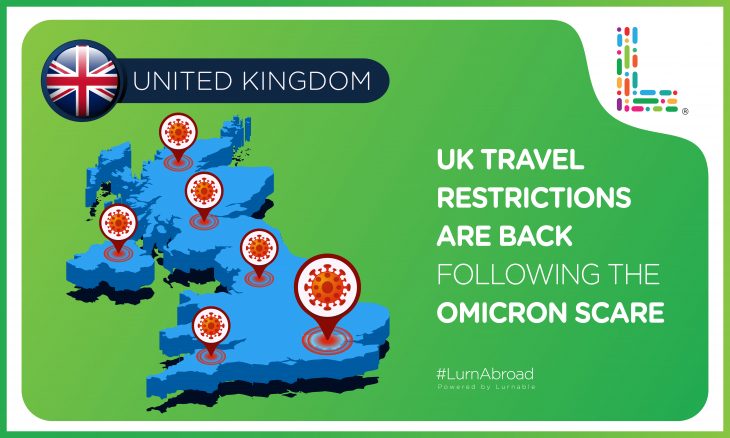If you have study abroad plans right now, the emergence of the Omicron strain in South Africa is one big reason to worry. The new strain of the coronavirus has forced several countries to go on the precautionary mode again. The UK is also among them, so international students planning to travel to the country need to know all about the new travel restrictions.
The Omicron strain has already been detected here, bringing a new challenge for the authorities. Prime Minister Boris Johnson has decided to take quick action to contain the virus, and the new UK travel restrictions are one of the steps being implemented. Here is all that you need to know before going ahead with your plans.
NEW TEMPORARY RESTRICTIONS ARE IN PLACE
The emergence of the Omicron variant is a big concern for the UK government, and it has stepped up the efforts by announcing some temporary precautionary measures. These include the reintroduction of PCR tests and mask mandates for international arrivals. Further, the public will have to wear masks mandatorily in shops and on public transport. There will be even tighter norms for people arriving from overseas. The UK had previously scrapped mask-wearing in public places in July. But they were still required on public transport and indoor areas in Wales, Scotland, and Northern Ireland.
A NEW RED LIST IS HERE
Apart from travel restrictions, the UK has also issued a new red list that includes ten African countries to limit the spread of the new variant. These include South Africa, Botswana, Malawi, Mozambique, Angola, Eswatini, Lesotho, Namibia, Zambia, and Zimbabwe. No passengers from the list can travel to the UK unless they are nationals or residents of the UK or Ireland. However, these passengers will have to opt for paid self-isolation in a pre-booked government-approved hotel for a ten-day period. These countries also face travel restrictions from many other countries such as the US, the Netherlands, Indonesia, Saudi Arabia, Qatar, and Kuwait.
ADVICE FOR INTERNATIONAL STUDENTS
As an international student from a non-Red List country, you will now need a PCR test before flying to the UK. You must get it even if you are fully vaccinated. Anyone who enters the country will have to take a test by the end of the second day after arrival. Further, they will have to self-isolate until getting a negative report. If you have been in contact with a suspected Omicron case, you must go into ten-day self-isolation. It means you have to be ready for these changes if you plan to land in the UK in the foreseeable future, though things may change down the line.
WHAT NEXT
According to officials, the UK government will review these steps in three weeks after the world knows more about the new strain of the virus. There are good chances that the vaccine will offer some defence against Omicron, so you can only wait and watch. The Department for Education has advisory for students in Year seven and above, school staff, and visitors to wear masks in communal areas. The guideline applies to all educational institutions in England, from schools to colleges and universities, and even staff in childcare settings.
The latest announcements regarding the new travel restrictions do not offer much detail. International students can connect with universities to get a better idea and plan accordingly. Most importantly, one must hope for the best!

If you are considering studying abroad why don’t you discuss your prospects and opportunities with experts at Lurnable’s dedicated study abroad counselling division LurnPathways?





